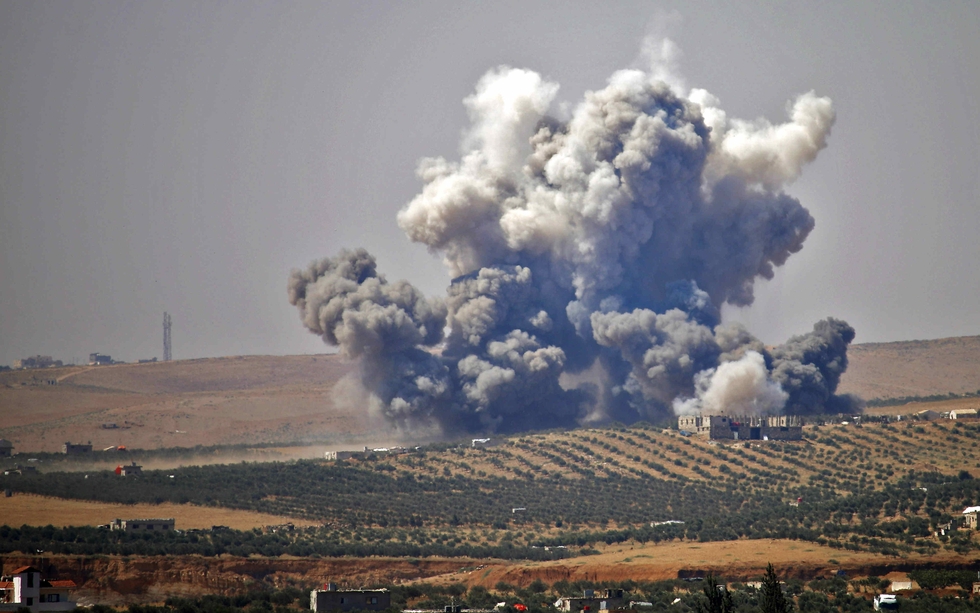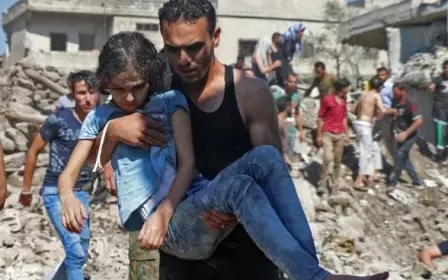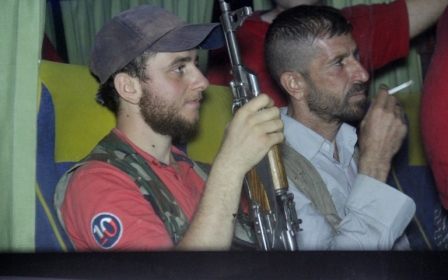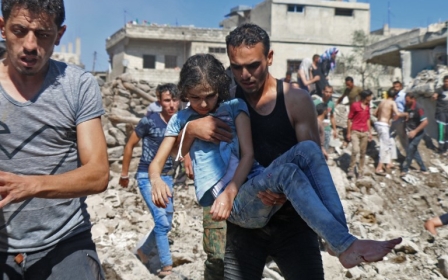Air strikes pummel Syria's Daraa after talks with rebels break down

Waves of air strikes pounded rebel-held areas of southern Syria on Thursday as pro-government forces launched their most intensive bombing campaign yet in a two-week-old offensive.
The renewed assault came after the failure on Wednesday of Russian-brokered talks to end the offensive in Daraa province, in which scores have been killed and tens of thousands have been forced from their homes.
"We refused their deal because it had no gains for rebels, and led to an utter surrender, which we will never do," Abu Shima Darawi, a spokesman of the Central Operations Room in southern Syria, which brings together opposition groups in the region, told Middle East Eye.
"We expect a military escalation in coming days and weeks aiming to kill more civilian and make it harder for us to live with dignity," Darawi added. "But this is much better than living with Russia's disgraceful agreement."
Meanwhile, Sohaib al-Rheil, a representative of the Alwiya al-Furqan brigades, condemned the attitude of the Russian negotiators.
"They were stubborn and didn't show any goodwill towards the negotiations," he said to MEE. "They summoned us to the negotiations table as if we were coming in to receive a lecture."
However, Syrian opposition spokesman Ibrahim al-Jabawi announced on Thursday that Jordanian mediation had succeeded in getting Syrian rebel negotiators back to the table with Russian officers, Reuters reported.
Jabawi said the two sides were expected to hold talks on Thursday evening in the southern town of Busra al-Sham that has already seen four rounds of talks since Saturday that have so far failed to bring any agreement.
Intensive bombing
An AFP correspondent on the edge of the rebel-held south of the city of Daraa, the divided provincial capital, said the bombing of rebel neighbourhoods was the most intensive since the launch of the Russian-backed offensive on 19 June.
Six civilians, including a woman and four children, were killed in the town of Saida, which pro-government ground forces were trying to take, said the Syrian Observatory for Human Rights.
The Observatory, a Britain-based activist group, said hundreds of missiles and crude barrel bombs were unleashed by Syrian and Russian aircraft overnight.
Observatory director Rami Abdel Rahman said the bombardment was an "attempt to make the rebels back down after they refused to subject themselves to the Russian terms for a ceasefire".
Samer Homssi, who fled to the outskirts of Daraa with his wife and four children, described a fierce onslaught of government air strikes and shelling.
"The bombardment has not stopped for one moment since the announcement that the negotiations failed," the 47-year-old, whose family was taking shelter in a grove of olive trees, told AFP.
"We are living here in the olive trees, afraid of everything, the shelling, the insects, with no water to drink or any medical services nearby. The situation is very difficult."
The Observatory said air strikes were ongoing, including on the town of Tafas in the northwest of Daraa province and on towns and villages near the Jordanian border.
The intensity of the bombardment allowed government forces to seize control of a security checkpoint on the Jordanian border for the first time in more than three years, it said.
Moscow has been brokering talks with rebel towns for negotiated surrenders in a carrot-and-stick strategy that Russia and Assad have used to retake large areas of territory including the Eastern Ghouta region near Damascus earlier this year.
More than 30 towns in the south have already agreed to surrender, expanding the government's control of Daraa province to around 60 percent, double what it held before the start of the offensive.
The talks this week focused on remaining rebel territory in Daraa province's western countryside and the southern half of the provincial capital.
Moscow's tough stance
After meeting with a Russian delegation on Wednesday afternoon, the joint rebel command for the south said talks had failed over the issue of the rebels surrendering their heavy weapons.
Rebel sources said Moscow had demanded rebels hand over all their heavy arms in one go but that opposition fighters wanted to do so in several phases.
Moscow has also reportedly refused requests from some rebels for safe passage to opposition-held territory in other parts of Syria, as was done in Eastern Ghouta and Aleppo.
Daraa is considered the cradle of the 2011 uprising against President Assad's rule, when brutal repression by regime forces triggered Syria's devastating civil war.
Nearly 150 civilians have died since the assault began, according to the Observatory.
The southern offensive has also displaced between 270,000 and 330,000 people, according to the United Nations, many south to the border with Jordan or west to near the Israeli-occupied Golan Heights.
Both countries have kept their borders closed, despite mounting calls by human rights groups to let Syrians escape to safety.
World powers have criticised the operation for violating a ceasefire announced last year by Washington, Amman and Moscow, but that has not halted the blitz.
The UN Security Council will hold a closed-door emergency meeting on the offensive on Thursday.
Zouhir Al Shimale contributed reporting from Syria.
New MEE newsletter: Jerusalem Dispatch
Sign up to get the latest insights and analysis on Israel-Palestine, alongside Turkey Unpacked and other MEE newsletters
Middle East Eye delivers independent and unrivalled coverage and analysis of the Middle East, North Africa and beyond. To learn more about republishing this content and the associated fees, please fill out this form. More about MEE can be found here.




